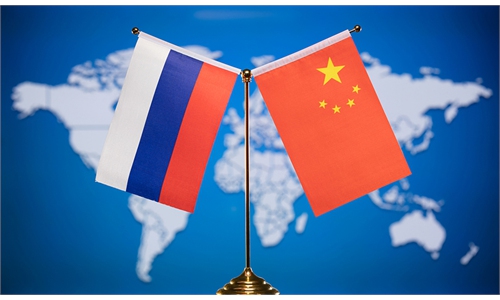More advanced collaboration expected in 2024 China-Russia ties

China, Russia. Illustration: Chen Xia/GT
In his New Year greeting message to Russian President Vladimir Putin, Chinese President Xi Jinping said that in the face of changes unseen in a century and volatile international and regional situations, China-Russia relations have always maintained healthy and stable development, and moved steadily in the right direction in 2023. Putin sent heartfelt greetings on the occasion of the New Year 2024 and the approaching Spring Festival to Xi, stressing that the two Russia-China summits held in 2023 gave a powerful impetus to the development of comprehensive partnership and strategic interaction between the two countries in all areas.Indeed, the year 2023 was not easy for both Moscow and Beijing as both nations faced fundamental challenges to their security and development. Moscow was trying hard to cope with massive sanctions and continuous Western attempts to isolate Russia from the international system. Beijing had to find solutions to the US "de-risking" policy that had resulted in a sharp drop in China-US bilateral trade and major restrictions on China-US hi-tech cooperation. The less stable and potentially more hostile international environment in 2023 further motivated Moscow and Beijing to strengthen their ties in various areas, including economic cooperation, solidarity in UN Security Council voting, and coordination on regional crises.
It's evident that this trend will continue throughout this year. It is worth mentioning that in 2024, both countries will celebrate the 75th anniversary of their diplomatic relations. The Soviet Union was the first nation to recognize the People's Republic of China, the day after Mao Zedong announced a new chapter in Chinese history on October 1, 1949. Therefore, we can expect to see many commemorative events, such as official visits, business forums, culture festivals and academic conferences. In 2023, there were already two face-to-face bilateral summits - President Xi Jinping came to Moscow in March, and President Vladimir Putin visited Beijing in October. Additionally, there were online contacts between the two leaders. The frequency of high-level bilateral engagements is likely to continue increasing.
This interaction looks particularly important since the next 12 months promise to be no less challenging than the last 12. Most of the ongoing conflicts in Europe, the Middle East, Africa and other parts of the world are likely to continue. The short-term future of the global economy remains highly uncertain. Due to accelerating climate changes, threats of natural disasters are growing all over the planet. The forthcoming elections in the US, United Kingdom, European Parliament, India, Indonesia, the Taiwan island and many other places generate even more uncertainties. To sum up, there will be no shortage of topics that Russia and China could compare notes on in 2024.
The question, however, is whether 2024 turns out to be mostly a continuation of the bilateral interaction within already existing formats and substantive priorities of recent years or it becomes a gateway to some new, more innovative and potentially more efficient patterns of engagement. In a way, an ambitious but not unattainable goal would be to move from more or less basic cooperation to more advanced collaboration. The difference between the former and the latter might look insignificant, or even irrelevant, but it should not be overlooked. Cooperation essentially means that the two sides assist each other in support of the other side's goals. Collaboration implies that the two sides have shared interest in a specific outcome of their joint efforts. Cooperation does not assume a common vision, while collaboration does. For instance, two neighbors renovating their apartments simultaneously and exchanging extra wallpaper for tiles are cooperating, but not collaborating with each other. However, an architect and a civil engineer working together on building a house, are engaged in a joint collaborative project.
What does this mean for China-Russia relations? Let us take, for example, their economic dimension. 2023 was a very successful year for bilateral trade that has already surpassed the psychological mark of $200 billion. Another important accomplishment is that 90 percent of this trade is now denominated in national currencies compared to only 25 percent two years ago. However, numbers might be delusive: The overall financial performance of bilateral trade depends to a large extent on the fluctuations of global prices on oil, gas, coal, timber and other commodities that now amount to 70 percent of Russia's exports to China. Although, most of China's exports to Russia are denominated in renminbi rather than in dollars, possible shifts in dollar-ruble exchange rates might have a significant impact on the absorption capacity of Russian markets. To move from cooperation to collaboration in the economic field would mean not only to diversifying bilateral trade but also complimenting this trade with launching numerous and diverse joint production chains. That means foreign direct investments, which now constitute a very modest part of the bilateral cooperation, should get a higher priority than traditional trade.
The same dilemma between cooperation and collaboration exists in the field of China-Russia humanitarian interaction. Next year, bilateral tourist flows are likely to surpass the pre-pandemic levels. The overall number of Chinese tourists in Russia in 2024 may well rise to 2-2.5 million, which would be a truly remarkable accomplishment. The numbers of Russian tourists visiting China is also likely to grow very fast this year.
Moving from cooperation to collaboration in the humanitarian field should mean complimenting tourism with bottom-up, problem-focused joint initiatives of civil societies in a broad variety of areas - from climate change and biodiversity preservation to community development and fighting domestic violence. Working together at the grass-roots level on specific projects should help to weave the fabric of social interaction that is absolutely indispensable for a stable long-term relationship.
Likewise, China-Russia interaction within multilateral international Institutions and gatherings, like the UN Security Council, G20, BRICS, SCO, APEC, among others, should go further beyond coordinated responses to moves of Moscow's and Beijing's geopolitical adversaries or parallel reactions to unfolding crises. This interaction should not be limited to the principle "you scratch my back and I'll scratch yours," but should imply a common vision of a desirable world order.
Both nations stand for change in the international system, though Russia takes a more "revolutionary" approach to this change, while China tilts toward a more evolutionary transition. Apparently, the time has come to convert these coinciding or overlapping positions into something more specific and practical - including detailed roadmaps and business plans with schedules, timetables and deadlines, nuanced and customized proposals to both like-minded partners and dissenting adversaries. Hopefully, throughout 2024 the two sides could make an important step in moving from basic cooperation to more advanced forms of collaboration. This development would serve not only strategic interests of the two sides, but also global stability.
The author is the academic director of the Russian International Affairs Council. opinion@globaltimes.com.cn


